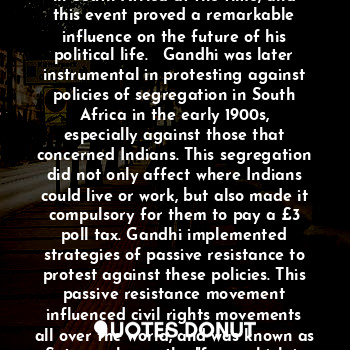
Written By SIBIN
On 7 June 1893, M.K Gandhi, later known as "The Mahatma" or "Great Soul" was forcibly removed from a whites-only carriage on a train in Pietermaritzburg, for not obeying laws that segregated each carriage according to race. Gandhi was practising as a young Indian lawyer in South Africa at the time, and this event proved a remarkable influence on the future of his political life. Gandhi was later instrumental in protesting against policies of segregation in South Africa in the early 1900s, especially against those that concerned Indians. This segregation did not only affect where Indians could live or work, but also made it compulsory for them to pay a £3 poll tax. Gandhi implemented strategies of passive resistance to protest against these policies. This passive resistance movement influenced civil rights movements all over the world, and was known as Satyagraha, or the "force which is born of Truth and Love or non-violence". Gandhi trained many Indians in this form of protest, and many were jailed for their activities, including Gandhi himself.Download

8 Reads •